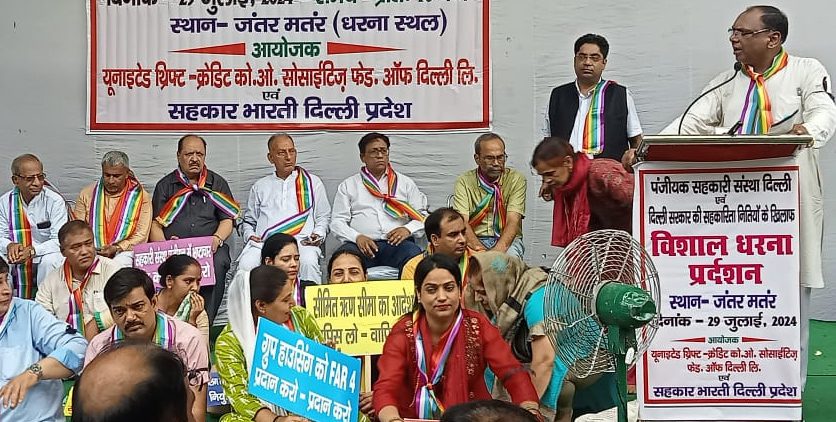In response to the growing challenges faced by credit cooperative societies in Delhi, the United Thrift and Credit Cooperative Societies Federation of Delhi led by its office bearers including Sunil Gupta is actively working toward solutions.
The Federation plans to submit a memorandum to the Lieutenant Governor, urging intervention. Memorandums will also be presented to the top leadership of Delhi’s three main political parties – BJP, Congress, and AAP, said Gupta talking to the Indian Cooperative.
To raise awareness, posters are being displayed across the city, and press conferences along with campaigns on electronic and social media are planned. The Federation has vowed to pursue legal action if necessary and has called on members for support in terms of effort, dedication, and financial contributions to ensure their demands are met. Leaders express confidence that with collective efforts, the campaign will achieve its goals.
The cooperative sector in Delhi traces its roots to the enactment of India’s first Cooperative Act in 1904. With cooperatives being a state subject, Delhi implemented its first Cooperative Act, the Delhi Cooperative Societies Act, 1960, which facilitated the registration of agricultural, non-agricultural, rural, and urban cooperative societies. Subsequently, in 1972, the Delhi Cooperative Societies Rules were established.
During the Bharatiya Janata Party (BJP) government (1993–98), then Education and Cooperative Minister Dr. Sahib Singh Verma, under Chief Minister Madan Lal Khurana, initiated amendments to the 1960 Act. A committee led by Dr. Nand Kishore Garg proposed revisions that were later enacted as the Delhi Cooperative Societies Act, 2003, under Chief Minister Sheila Dikshit’s Congress government.
The act, notified in 2007, remains in effect today. Additionally, Dr. Verma’s administration formed a high-powered committee to address housing cooperative societies, whose recommendations were also incorporated into the 2003 Act.
In 2003, the Congress government, under Cooperative Minister Dr. Yoganand Shastri, established the Delhi State Cooperative Development Board. However, due to inadequate planning, it failed to achieve its objectives. Presently, the Aam Aadmi Party (AAP) government has shown little progress or interest in advancing the cooperative sector.
Delhi is home to approximately 6,000 registered cooperative societies, including agricultural, non-agricultural, urban banks, housing cooperatives, and more.
These societies serve around 2.5 million members, operate under the leadership of about 40,000 directors, and employ nearly 20,000 workers. Despite a steady increase in the number of cooperatives over the past two decades, persistent neglect by successive Delhi governments has led to mounting challenges, including widespread corruption within the Cooperative Department. Many societies face harassment even for minor tasks, turning the department into a hub of inefficiency.
Meanwhile, the central government has taken significant steps to enhance the cooperative sector nationwide, such as forming a dedicated Ministry of Cooperation, introducing reforms, and planning a new National Cooperative Policy. In stark contrast, the state of cooperatives in Delhi remains dismal due to governmental apathy and the lack of political will across all parties.
The State Cooperative Union and other cooperative organizations, despite their potential, have failed to address the sector’s issues effectively. Furthermore, cooperative-sensitive organizations like Sahakar Bharati have not been given the platform or collaboration needed to influence policymaking.
To revive the cooperative sector in Delhi, there is an urgent need to adopt successful models from states like Gujarat and Maharashtra. Policymakers, political parties, and the administration must focus on revitalizing the sector. It is imperative that cooperative-related reforms feature prominently in the manifestos of all political parties in the upcoming Delhi Assembly elections.
Key expectations include the formulation of a cooperative policy, restructuring the Delhi Cooperative Development Board, eliminating corruption, filling vacant posts in the department, ensuring the democratic functioning of state-level cooperative unions, resolving debt recovery issues, and upgrading the Cooperative Department’s technological capabilities.
This appeal urges all stakeholders to take decisive action to save and strengthen the cooperative sector, ensuring its role in the socioeconomic development of Delhi.
